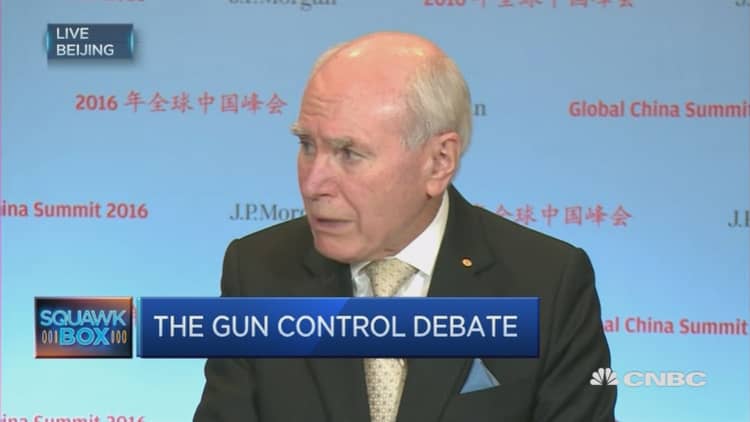Four gun policy measures failed to pass the 60-vote threshold to move forward in the Senate on Monday, following impassioned debate from both sides of the aisle.
The votes came just over a week after a deadly shooting spree in a gay nightclub in Orlando — the nation's worst mass shooting in modern history — and a subsequent 15-hour filibuster by Senate Democrats who demanded action on gun control.
More from NBC News:
'No Fly, No Buy' Has Political Momentum, But May Have Little Impact
What You Need to Know About Gun Policy Votes
Mother of 11 Laid to Rest After Orlando Shooting Massacre
The four amendments — two filed by Sens. Dianne Feinstein, D-California, and Chris Murphy, D-Connecticut, and two other, less restrictive measures filed by Sens. Chuck Grassley, R-Iowa, and John Cornyn, R-Texas — addressed background checks of prospective gun buyers and the sale of guns and explosives to people on terrorist watch lists.
In a release following Monday's session, the NRA called the Senate vote an "embarrassing display" and suggested President Obama and the Democrats were playing politics.
"We all agree that terrorists should not be allowed to purchase or possess firearms," executive director Chris Cox wrote. "We should all agree that law-abiding Americans who are wrongly put on a secret government list should not be denied their constitutional right to due process. These are not mutually exclusive ideas. It is shocking that the safety of the American people is taking a backseat to political theatre."
It was always unlikely that any of the Democrat-backed proposals would move forward, since 60 votes were needed to pass — more than the number of that party's members in the Senate.
Still, Monday's votes forced lawmakers to take a stand on the controversial gun policy reform issue in a very public way. This is especially key for politically vulnerable lawmakers in tough re-election fights.

Sen. Kelly Ayotte, R-New Hampshire, voted with fellow Republicans for Cornyn and Grassley's measures, but against Murphy's. She broke with party lines to vote for Feinstein's amendment.
Another embattled Republican, Sen. Mark Kirk, R-Illinois, voted in favor of the two Democratic-backed amendments. Kirk, who co-sponsored Feinstein's amendment, was the only Republican senator to vote in support of barring those on the terror watch list from buying guns in December 2015.
With Sen. Bernie Sanders, I-Vermont, returning for his second vote of the year, all 100 senators voted for the first time this year.
Dan Gross, president of the Brady Campaign to Prevent Gun Violence, said in a statement following the vote, "Shame on every single senator who voted against these life-saving amendments and protected the rights of terrorists and other dangerous people to buy guns."
Feinstein's so-called "no fly, no buy" amendment would have blocked people on a terrorist watch list banned from flying while under investigation from buying a gun. The measure would also have empowered the attorney general to prevent a gun purchase if there was "reasonable belief" the person could use the weapon for terrorism.
Republicans blocked a similar measure last year.
Cornyn's amendment would have allowed the attorney general to delay a gun purchase for up to 72 hours by a suspected terrorist or a person investigated for terrorism in the last five years. A court order could also have been sought to prevent the sale.
Senate aides believe there could be room for compromise by extending the review period for those previously on the watch list who were later removed.
Dueling amendments on improving background checks for gun sales echoed debates of years' past when, in the year following the shooting massacre at Sandy Hook Elementary School in Newtown, Connecticut, a bipartisan bill on background checks failed.
"I know at a deep personal level what Orlando is going through," Murphy said on the Senate floor. "For all of the scarring, psychological harm that comes with losing a loved one or a neighbor, more harm is piled on when you find out that the people you elected to run your country just don't care. It hurts something awful when you lose someone, but it gets worse when your leaders are silent, are totally silent in the face of your personal horror."
The amendment by Murphy, who led last week's filibuster marathon, would have expanded the background check system, mandating that sales at gun shows and over the internet be subject to closing the so-called "gun show loophole." Federal agencies would have had to certify that they submitted to the National Criminal Instant Background Check System all records identifying individuals prohibited from buying a gun and penalize states that failed to make data electronically available to the background check system.
Grassley's amendment would have improved the NICS system by better funding the program and providing additional resources. Additional incentives would have encouraged the sharing of mental health records.
Prior to the vote, Grassley argued, "Time and again, the other side says they support Second Amendment rights. We have every reason not to believe them. The terrorist watch list amendment that they now propose violates the Second Amendment right to keep and bear arms, and it violates the Fifth Amendment's due process clause."
As the night wore on, the debate was mired in politics, as Democrats hammered Republicans on the issue. Presumptive Democratic presidential nominee Hillary Clinton and Senate Democrats see a great benefit to politically pursuing gun reform, said Kristin Goss, associate professor of public policy and political science at Duke University and co-author of "The Gun Debate: What Everyone Needs to Know."
"Voters' positions on gun policy have pretty well lined up with their party's position," Goss said. "Democratic candidates used to have to worry about their pro-gun men, and Republican candidates used to have to worry about their pro-control women, but those swing constituencies just aren't as much of a factor as they once were. I think, too, that the Democrats recognize that their base is galvanized by the endless mass shootings and much better organized than ever before."

